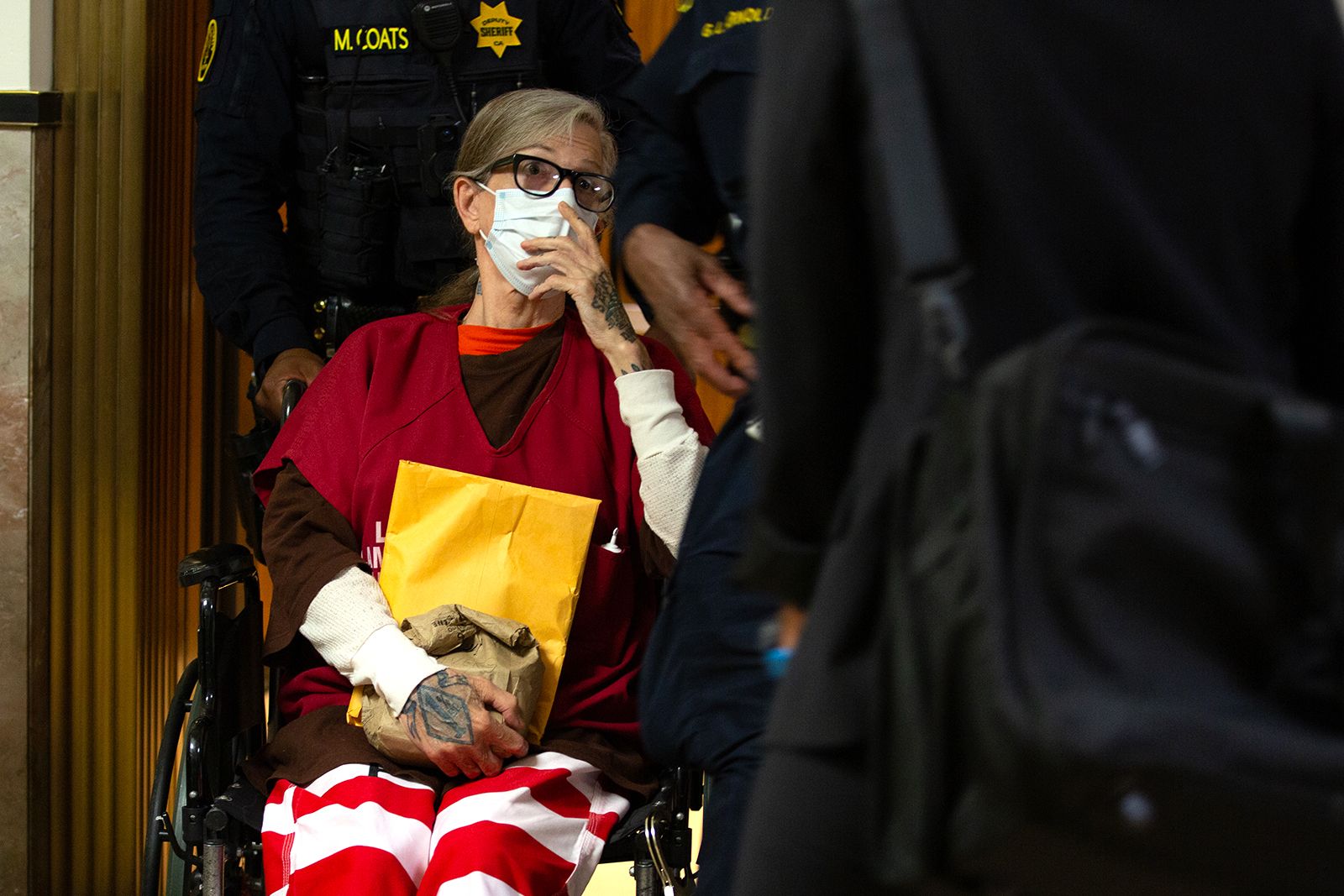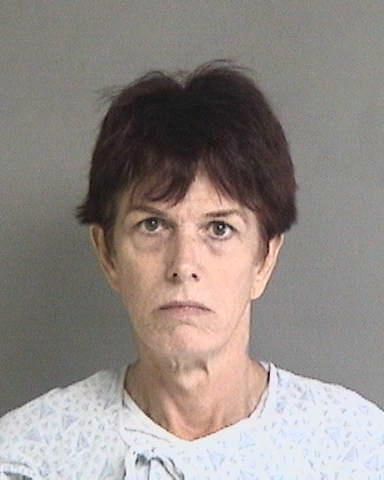Judge: Dana Rivers was sane during murder of Oakland family
Dana Rivers said she was insane when she killed a lesbian couple and their son in 2016. An Alameda County Superior Court judge disagreed.

Dana Rivers, who brutally murdered an Oakland family at their home in 2016, was sane at the time of the crime, an Alameda County Superior Court judge has ruled.
"The facts of this case indicate planning, sophistication and a systematic effort to cover up the crime," Judge Scott Patton said Thursday, "as opposed to a triggering event that led to a spontaneous violent unknowing act."
In mid-November 2022, a jury found Dana Rivers guilty of murdering Charlotte Reed, Patricia Wright and their 19-year-old son Benny Wright at their Oakland home on Nov. 11, 2016.

Benny Wright had graduated from Berkeley High in June of that year. And Patricia Wright worked for the Berkeley Unified School District as a deaf interpreter and teacher for nearly a decade, as this reporter previously wrote on Berkeleyside.
Rivers, a 67-year-old transgender woman from San Jose, initially entered a not-guilty plea in the case, but later amended her plea to not guilty by reason of insanity, arguing in part that she committed the killings during a PTSD episode where something had triggered her.

During the 2016 murders, Patricia Wright and Charlotte Reed were shot and stabbed repeatedly. Benny Wright was shot in the torso. He made it outside their home in the 9400 block of Dunbar Drive, shirtless and in pajama pants, but collapsed unresponsive in the street.
A neighbor heard gunfire and called police. Minutes after officers arrived, Dana Rivers walked outside.
Rivers, then 61 years old, was "covered in wet blood" and reeked of gasoline, according to court papers. A fire was burning in the garage, but firefighters extinguished it before it spread.
After Rivers' conviction in November, Patton dismissed the jury and oversaw the "sanity phase" of the trial himself.
An Alameda County Superior Court jury just found Dana Rivers guilty on all counts. Rivers killed a lesbian couple and their son in Oakland in 2016. Jury to return Dec. 5 for the sanity phase of the trial. Here’s the background from earlier this week. https://t.co/VphKk1s12U
— The Berkeley Scanner (@BerkeleyScanner) November 16, 2022
The sanity phase took place over approximately eight days between Dec. 5 and Thursday, Jan. 5, when Patton announced his verdict.
The schedule was fragmented due to witness availability, the holidays and illness; in December, the judge tested positive for COVID-19 and watched some of the proceedings remotely.
During the course of the month, three forensic psychologists who had been hired by the court to evaluate Rivers in recent years testified about their findings.
Only one of the three, Marlin Griffith, determined that Rivers was insane at the time of the murders.
Psychologist: "She knew she was in trouble"
On Thursday, Judge Patton said he had been "particularly impressed" by the opinion of a different psychologist, Amy Watt, due to her thorough assessment of Rivers in 2021.
"When she was arrested," Watt had testified, "she told the arresting officers that she knew she was in trouble."
Rivers had declined to provide a statement to police and quickly asked them to call for a lawyer. She had tried to light the house on fire and said she knew people inside the house were dead.
"She knew she was in trouble," Watts said, "which meant that she knew right from wrong."
On Thursday, Patton also noted that, while Rivers had been sent out from Santa Rita Jail for a "5150" psychiatric evaluation shortly after her arrest, "she was evaluated and they determined that she did not fit the criteria for 5150," he said. "She did not have any signs of psychosis and she did not have any suicidal or homicidal ideations."
He said Rivers' actions before and after the murders indicated that she knew what she had done was morally and legally wrong.
"Don't get yourself hurt, bitch"
Last week, prosecutor Abigail Mulvihill of the Alameda County district attorney's office argued that all three victims may have been asleep when they were attacked.
The prosecution also presented evidence to show that the murders may have been carried out as some kind of retribution related to The Deviants, a motorcycle club that Rivers had been part of and with which Charlotte Reed had briefly been associated.
To support that claim, Mulvihill put forward a text message sent by The Deviants' club president to Reed.
"Stay smart and don't get yourself hurt, bitch," the president had written, according to the prosecution. "If I were you, I'd back the fuck off before you overstep out of the lines you're so close to crossing. Don't think I don't know where the fuck you visit and what you're doing."
Mulvihill had argued that Rivers had been extremely proud of her association with The Deviants and that she was promoted to higher office in the club after the murders.

Dana Rivers. Alameda County Sheriff's Office
On the night of the murders, Rivers had brought with her a firearm and silencer, three loaded magazines, latex gloves, lighters and knives — which Mulvihill said was clear evidence of a plan.
Rivers' attempt to cover up the murders by setting the house on fire was another indicator that she was aware of what she had done, Mulvihill argued.
As part of her case, Mulvihill also presented evidence of a jailhouse phone call where Rivers had told her brother that her life had never been in more control than it was on the night of the murders.
Rivers also insisted in a jail call that she did "not get into situations without understanding the consequences," the prosecutor said.
A need for an explanation "other than a horror movie"
In her closing arguments, defense attorney Melissa Adams, of Rien, Adams & Cox LLP, told the judge that Rivers had "mostly lived the life of an upstanding citizen" prior to the murders, although she had her "ups and downs."
In 1999, Rivers had won national attention as a transgender advocate who had lost her teaching job at a Sacramento-area high school after saying she planned to have a sex change.
At some point, Rivers was diagnosed with PTSD, which generally caused her to struggle with impulse control, anger outbursts and interpersonal conflicts, her attorney said.
Adams argued that Rivers may have carried weapons and ammunition with her to Oakland because of "hypervigilance" related to her PTSD diagnosis and the need to feel safe.
On the night of the murders, Adams said Rivers had experienced a "rage reaction" due to something that happened inside the home on Dunbar Drive.
According to the evidence, Rivers had stabbed Reed 40 times after shooting her, which one forensic psychologist had described during his testimony in December as "overkill."
Adams said that alone was evidence of impulsive behavior rather than planning.
On the night of the murders, Rivers had run around inside the house on Dunbar Drive, leaving "her own blood all over the crime scene," Adams told the judge.
"This is not the vision of a person who is in control," she said.
Adams also noted that Rivers had left the murder scene and gone around the block before returning to the home on Dunbar Drive — actions that easily could have led to her capture or discovery.
"Why would she take that chance?" Adams asked. "Ms. Rivers was not thinking clearly."
She also encouraged the judge not to put too much stock into Rivers' jailhouse phone call comments.
"They are unreliable — because she is unreliable," Adams said, due to her "need to create a narrative that feels like something other than a horror movie."
In her closing arguments, Adams also noted that there was nothing she could say about the victims that might help lessen the pain of the loss for their loved ones.
"I cannot bring them back," she said. "Ms. Rivers will pay for those crimes for the rest of her life."
Going forward, Rivers will have a public defender
Not guilty by reason of insanity trials are rare in Alameda County.
The last one took place in 2020, according to court papers, after John Lee Cowell was found guilty of murdering 18-year-old Nia Wilson and stabbing her older sister Letifah Wilson, seriously wounding her, on the MacArthur BART platform in Oakland in 2018.
On Thursday, after Judge Patton announced his verdict that Rivers was sane at the time of the murders, Adams immediately asked the court to appoint a new attorney for Rivers to handle what comes next: a motion for a new trial and an assessment of whether Adams had done an effective job in her defense of her client.
"There were a lot of judgment calls that I needed to make along the way," Adams told the judge, "both in terms of the proof that I put on and witnesses that I chose not to call."
She told the court it would be appropriate for a different defense attorney to evaluate her work "at this stage rather than simply leaving that to the appeal."
Adams initially was hired as private counsel for Rivers but never was paid, according to court records reviewed by The Berkeley Scanner.
Several years later, she was appointed by the court to represent Rivers due to her familiarity with the case.
Several members of Charlotte Reed's family have attended much of the murder trial in recent months, but they have so far declined to comment on the case.
Dana Rivers is now set to return to court Jan. 31 for an attorney hearing as the case moves toward sentencing and appeal.





